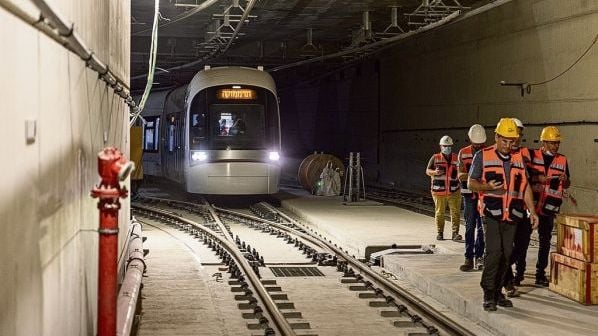AS main line, metro and light rail networks are developed and expanded, Israel is facing a looming shortage of experienced railway engineers. Rather than relying on outside experts and consultants to fill knowledge gaps the country is also looking to nurture home-grown talent to both build and oversee these networks when they enter operation.
Central to these plans are two new continued education programmes offered by Israel Institute of Technology’s (Technion) Institute for Transport Research.
“There are huge plans and some investment to develop rail systems, but the know-how is limited,” says Mr Tomer Toledo, head of the Israel Institute of Technology’s (Technion) Institute for Transport Research and the Unit for Foreign and Continuing Education, and member of the Civil and Environmental faculty. “There are people who have done it in the past, but there are not very many of them left.”
Israel’s steady improvement and expansion of its railway network in the early 1990s created demand for rail engineers in the country. This coincided with a wave of immigration following the collapse of the Soviet Union, with many people bringing their skills and knowledge to the country’s rail sector. But as these employees now reach retirement age, Technion is seeking to fill the gap. Companies involved in projects to construct light rail lines in Tel Aviv and Jerusalem are likely beneficiaries.
“The people that they are hiring are perhaps not fully trained for the job so they’re getting consultants to help them and hoping people learn on the job,” Toledo says. “It’s not a good position to be in, to depend on your suppliers and on external expertise because their interests may not align with yours, and because you want to be independent. You cannot go to them for everything all the time.
The new programme is the result of discussions between Israel Railway’s (IR) training department and Technion’s Continued Education Unit. The curriculum has been developed at Technion’s Transportation Research Institute in collaboration with professionals in IR, the Ministry of Transport and the other government agencies, with support from Professor Allan Zarembski at the University of Delaware and Professor Felix Schmid at Birmingham University.
“There are huge plans and some investment to develop rail systems, but the know-how is limited. There are people who have done it in the past, but there are not very many of them left.”
Tomer Toledo
The first programme focuses on rail engineering and covers the physical and geometric design of railways, including track engineering and design, track laying, maintenance and inspection, safety and derailment prevention, and geotechnical engineering. Two year-long classes have been completed, a third is currently underway and registration is open for a fourth. Based on the success of this programme, Technion will this month launch a second programme on rail systems, covering rolling stock, propulsion and electrification, signalling and control, and maintenance.
The intake on each course is limited to 30 students to maximise the benefits to each student, with training generally held once a week on a Thursday, the last day of the working week in Israel. There have been some exceptions to this, with Zarembski travelling to Israel before the Covid-19 pandemic to teach concentrated courses over two or three weeks, although this changed to an online course during the pandemic.
The course is taught by academics, practitioners and professionals, and each programme requires 200-250 contact hours. These are mostly in-person with some remote class meetings, and also include independent and team projects, and several field visits.
The programmes are expected to expand and hone the expertise gained from working in other sectors, and are only open to applicants with prior engineering experience, such as civil or mechanical for the rail engineering course and mechanical, electrical, industrial or civil engineers for the rail systems programme.
Toledo is a transport professor and civil engineer by profession and oversees the programme to ensure it is delivered to an academic level.
“I see my role as kind of a watchdog to see that the level is what you would expect in an academic programme versus a pure professional training programme,” he says. “We hope to not only train the students for a specific project now, but also so they can adjust and work on future systems where things are changing. Especially these days when there’s a lot of innovation and there’s a lot of new technologies, we’re really trying to get them to understand the principles and not just ‘when A and B happens, you do C and D’.”
Discussions are underway to open up the course to other people already working in the rail industry but have not qualified as engineers. This could fill skills gaps and provide these employees with an improved understanding that goes beyond their existing training.
“[Previous courses] don’t talk so much about the scientific principles behind why it works this way, what the mechanics and physics of it are,” Toledo says. “It’s much more down to earth and practical with limitations. These engineers can talk technically, they can operate software, but they’re sometimes not fully versed in the logic behind it, or why it works this way.”

